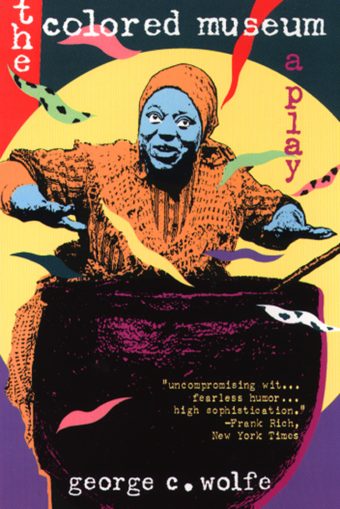

Good Morning POU!

The Colored Museum is a play written by George C. Wolfe that premiered in 1986, directed by L. Kenneth Richardson. In a series of 11 “exhibits” (sketches), the review explores and satires prominent themes and identities of African-American culture.

The Exhibits (Sketches)
Git on Board: Miss Pat, a flight attendant, welcomes the audience aboard the fictional “celebrity slaveship,” whose Savannah-bound journey from the Ivory Coast demands that passengers (audience) are to obey the “Fasten Shackles” sign and are not to rebel. The sketch explores and critiques the history of African Americans, from slavery to the regency of the basketball star.
Cooking’ with Aunt Ethel: Mammy Aunt Ethel host a cooking show in which she sings the recipe on how to “bake yourself a batch of Negros.”
The Photo Session: A glamorous black couple wearing “the best of everything and perfect smiles,” retreat from their past/history into a superficial world of narcissistic glamour. The Photo Session is Wolfe’s critique on the images and models of Ebony magazine.
Soldier with a Secret: In a monologue, deranged African American soldier sees his peers’ painful future and chooses to spare them the inevitable by killing them before they are forced to endure what their future holds.
The Gospel According to Miss Roj: Miss Roj, a transgender woman, “looks beneath the surface of her glittery nocturnal existence to find maggot-laced visions of ‘a whole race trashed and debased’ while in a homosexual nightclub.”
The Hairpiece: A woman getting ready for a date is faced with an identity crisis when her two wigs, one a 1960s afro wig, the other a “long flowing wig,” come to life and “debate the ideological identity conflicts they represented in their owner’s life for 20 years.”
The Last Mama-on-the-Couch Play: Presented by a “Masterpiece Theater”-type announcer, this exhibit explores and satirizes Black drama formula used in theater and film. Some characters include a “well worn” mama on her “well worn” couch who fights with her son Walter-Lee-Beau-Willie-Jones whose “brow is heavy from three hundred years of oppression.”
The Last Mama-on-the-Couch is Wolfe’s parody of Raisin in the Sun and goes from overacted melodrama to an all-black broadway musical number. The Lady in Plaid, who is Walter-Lee-Beau-Willie-Jones’ wife, is nod to the play For Colored Girls Who Have Considered Suicide / When the Rainbow Is Enuf where each of the unnamed women were referred to as The lady in [a color] (e.g., The Lady in Brown). In For Colored Girls, Beau Willie drops his kids (which he has with The Lady in Brown) out the window like Walter-Lee-Beau-Willie-Jones does to his children with The Lady in Plaid. Walters sister, Medea, represents the black Madea.
Symbiosis: A man is confronted by his former childhood self while trying to throw away his past, “only to discover that his rebellious younger self refuses to be trashed without a fight.”
Lala’s Opening: Singer Lala Lamazing Grace is haunted by her former childhood self, an identity she thought she disposed of.
Permutations: A monologue in which Normal Jean, a young southern girl, explains to the audience how she laid a giant egg which is filled with babies.
The Party: Topsy Washington imagines a huge party in which “Nat Turner sips champagne out of Eartha Kitt’s slipper” and “Aunt Jemima and Angela Davis was in the kitchen sharing a plate of greens and just goin’ off about South Africa.” This exhibit merges the past and present to create Topsy’s fantasy party which defies logic and limitations.
The Colored Museum simultaneously celebrates, satirizes and subverts the African-American legacy. Wolfe calls his play both, ‘an exorcism and a party.’ The Colored Museum explores contemporary African-American cultural identity, while, at the same time revisiting and reexamining the African American theatrical and cultural past. According to Wolfe, the legacy of the past must be both embraced and overcome.”
1991 TV production of The Colored Museum starring Danitra Vance, Linda Hopkins, Victor Love, Kevin Jackson, Reggie Montgomery, Vickilyn Reynolds, Loretta Devine, Tommy Hollis, Phyllis Yvonne Stickney and Suzzanne Douglas.
